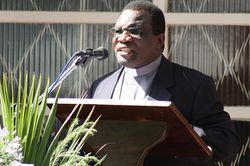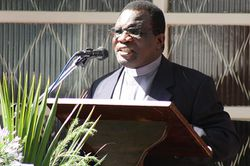Text: Zimbabwean archbishop reports on plight of his country
Source: CISA
Archbishop Robert Ndlovu, Catholic Archbishop of Harare and president of the Zimbabwe Catholic Bishops, Conference made the following speech at a roundtable hosted by the Denis Hurley Peace Institute, an associate body of the Southern African Catholic Bishops, Conference:
Thank you for inviting me to give an update of events in Zimbabwe, which are constantly changing, like the rate of inflation. The only constant is that everything seems to be going in the wrong direction, where we would rather not be.
I would like to base my presentation on the position adopted by our Conference on the signing of the memorandum of understanding between ZANU PF and the two formations of the MDC, which took place on the 21st July 2008.
In that statement on the MOU, we pointed out that the crisis in Zimbabwe is one that was caused by exclusion from power and from the people,s right to participate in the processes that affect their lives and from the benefits of growth and development. From the colonial times to the post independent times, governments have failed to facilitate the construction of a society that is respectful of the dignity of all persons and guarantee security, justice and peace. Instead, economic, political and social exclusion has encouraged the development of racism, negative ethnicity, gender discrimination and pessimism for the youth. The failure of national leadership has undermined real possibilities of creating a just and peaceful nation characterized by respect for human life, property and human dignity. It has also failed to facilitate genuine healing and reconciliation after the liberation struggle. This is why Zimbabwe today is characterized by lack of empathy and social solidarity. We pray that the nation discovers these social virtues so that the nation can be healed, reconciled and be one. (John 17:21)
Over the years, we have seen our nation sink more and more into economic, political and social crises. Economically, our crisis originated from the fact that we inherited a formal economy that was built to serve a few people. The marginal growth that we achieved after independence was not sustained and did not benefit everyone. With the introduction of the structural adjustment programs, corruption and mismanagement, our formal economy began to dwindle and more and more people were forced to join the non-formal economy which was not targeted by all our development policies and support. Today our formal economy has become more and more informalized. The formal economy which has shrunk to operating at 13 % is posting negative growth. While just a few are benefiting from the situation, the majority are marginalized, excluded, poor and suffering.
Politically, Zimbabwe has grown to be a deeply divided, unequal society where those in power work to protect their privileges by privatizing national state institutions and processes. The impartiality and national character of the executive, the judiciary, and the legislature have been compromised. We have seen the judges, magistrates; the police, the army and other security forces take more and more party political positions at the expense of the security and freedom of citizens. With the deepening of the political crisis, we have seen the growth of hate language in the media and at political gatherings culminating in intimidation, sexual abuse, rape, violence and gruesome killings of citizens. This has been made worse by the co-option of community and traditional leaders and the encouraging of non state militias, and ad hoc committees organized to demonize fellow citizens and to curtail free political activity.
Socially, the nation has undergone deep traumatic experiences resulting from the political and economic crises. The dignity and social security of persons have been undermined by poverty and marginalization. Natural human ties of respect and trust between people have been subverted as children have been turned against their parents, and citizens against citizens. The nation is presently deeply wounded physically, psychologically and socially. Fathers have been abused and women raped by age mates of their children and grandchildren. Children have been involved in and experienced levels of violence that are unprecedented. Families and communities have therefore, been divided and natural human solidarity destroyed.
Memorandum of Understanding of 21 July 2008
We, as the Catholic bishops in Zimbabwe have followed these developments with deep interest and concern. We have prayed over the matter and reflected in order to offer our advice, to contribute to the solution of the crisis and to offer hope for our nation. In the past we have collaborated with the Zimbabwe Council of Churches, the Evangelical Fellowship of Zimbabwe and other people of good will in facilitating the development of a national vision through the discussion document, The Zimbabwe We Want.
In that document we offered a list of social values, virtues and moral principles that we think can be the basis of a new Zimbabwe. We offer these same values again to be the basis of the processes that face us today. Previously we advocated the cessation of hostilities and divisions and the initiation of processes for national dialogue, reconciliation and healing. It is in this context that we welcome the developments that have occurred over the last few weeks culminating in the signing of the Memorandum of Understanding Between the Zimbabwe African National Union (Patriotic Front) and the Two Formations of the Movement for Democratic Change. We think that the meeting of our national political leaders to discuss possibilities for national dialogue is the best thing that has happened to this country for years.
We hope that the leaders are genuine when they say that they dedicate themselves "to putting an end to the polarization, divisions, conflict and intolerance that have characterized our country,s politics and that they are "determined to build a society free of violence, fear, intimidation, hate, patronage, corruption and founded on justice, fairness, openness, transparency, dignity and equality. We hope that our leaders appreciate that the whole country is anxious to see a resolution of the crises and the beginning of some fundamental transformation of our country into a just society characterized by growth with pro-poor development.
In order for the recent developments to be sustainable they will need to be much more inclusive than they have been so far. They will also need to be transparent and to be actively supported by all the people of Zimbabwe, especially those that have been brutalized, marginalized and impoverished. Therefore, while we think that the ongoing negotiations are positive, we also think that they could be more inclusive in order to enhance their legitimacy and acceptance. The following are our suggestions for that process to take place.
Immediate Demands
The Memorandum of Understanding which has been signed by the President and First Secretary of ZANU-PF, Cde. Robert G. Mugabe and the Presidents of the two MDC formations led by Mr. Morgan R. Tsvangirai and Mr. Arthur G.O. Mutambara has committed the parties to very specific issues. In the light of such commitments, we should immediately see fundamental changes in the conduct of political parties, agents of the law, the media, and local communities .Under Section10. Interim Measures, the Principals have committed to issuing "a statement condemning the promotion and use of violence and call for peace in the country and shall take all measures necessary to ensure that the structures and institutions it controls are not engaged in the perpetuation of violence.
So far, these statements have not been issued. As far as we know, not all institutions of violence have been dismantled. Some acts of political violence are still being committed. Even though the parties have committed themselves to "ensuring that the law is applied fairly and justly to all persons irrespective of political affiliation, members of some parties are still in detention and some being harassed for supporting some political parties. This needs to stop immediately.
Although there has been an agreement that the parties "will work together to ensure the safety of any displaced persons and their safe return home and that humanitarian and social welfare organizations are enabled to render such assistance as might be required, it is still difficult and impossible in some areas for the church to render such help to displaced persons. Hate speech on the radio, television and in newspapers is still to be abandoned. We urge the Principals, especially the one who controls state institutions and para-state institutions to act immediately in accordance with the agreement of the MOU.
In the light of the spirit of the MOU we urge that the following should take place immediately:
All intimidation and violence must stop immediately. Should it occur, it should be prosecuted swiftly in accordance with transparent and impartial justice.
All non-state institutions of violence should be dismantled.
All political prisoners should be vetted and released immediately they are not to be offered an amnesty since they have not been convicted of any crime.
Hate speech and hate language should cease immediately and in accordance with the MOU, and immediately each Party should promote language of respect and dialogue.
Immediate freeing of media space and promotion of free access to that space by all parties and stakeholders.
Assistance to all internally displaced persons and assurance of their safety to enable them to return to their homes.
The immediate lifting of the ban on the activities of NGOs and other civil society organizations to enable Churches and civil society organizations to operate freely in order to help the people in various areas of need and to assist in monitoring the progress of the Parties in implementing the MOU.
Reparation for losses incurred as a result of politically motivated violence.
The Church and Civil Society:
The Church and many people of good will in non-governmental organizations and civil society generally have worked very hard to help resolve the Zimbabwean crises. These people and institutions have resources, structures, and capabilities that can enhance the transformation process. Space will need to be created for them to participate and influence the form and content of the process. As Catholic bishops we would like to see the broadening of representation and consultation of more stakeholders in the Zimbabwean crisis. The constituted Reference Group, the SADC Facilitator and the negotiating parties and their technical teams should be accessible to and be able to listen to the concerns of the church, civil society and especially the poor and marginalized.
As the church, we have not been spared from the restrictions, suspicions and violence that have developed in our country. However, we think that we have an important and legitimate role to play at various stages of our country,s transitional process. First, as the negotiations are underway, we hope to be free to lobby, influence and monitor the process of negotiations. Secondly, we intend to hold accountable Parties to the agreements in order to encourage parties to keep their commitments. Thirdly, we intend to collaborate with our partners in Zimbabwe and other countries, especially in South Africa to freely lobby and advocate for issues that will ensure a people centered ethos that takes seriously the voices of ordinary citizens, especially women and the youth.
Economic Priorities
We urge negotiators to recognize the urgency of economic priorities. They will need to create an environment in which production can begin to take place and economic stability established. We need economic growth that is genuinely inclusive and pro-poor. Development is about facilitating the growth and fulfillment of people,s individual and community lives. Our national economic policies should stimulate and support inclusive economic growth and encourage genuinely universal participation in the economy. We urge the negotiating parties to adopt a human rights approach to development which prioritizes national economic needs highlighting the need for economic policies that will lift people out of poverty and genuinely access basic services as rights.
This necessitates appropriate national audits of state institutions, paying special attention to the need to balance the respective roles of the state and that of the private sector. We encourage transparency and the application of the rule of law in the economic sector and the abandonment of unnecessary and disruptive politicization of economic activities. This will ensure the end of corruption, patronage and arbitrariness and encourage the institutionalization of citizen participation in the economy. In this spirit, the land reform process should be completed and uncertainties in property ownership resolved justly and transparently.
We realize that the present negotiations are focusing on political accommodation and inclusion. We urge the negotiators to focus on the economic needs of the nation and guard against perpetuating unnecessary and uneconomic politically motivated institutions and structures in a bid to accommodate members of their respective political parties. Therefore, parties to the negotiation should work to eliminate unnecessary institutions and positions that are a drain on the fiscus. This would mean streamlining the cabinet and making rule-based appointments and decisions rather than those based on discretion and cronyism.
Political Priorities
We urge the negotiators to immediately recognize the need for a new political spirit and culture. In this new spirit, clear distinctions between the "ruling party and the government and institutions of state will need to be respected. The proper role of the state as a national common good accessible to all citizens should be established. State institutions will need to be professionalized and strengthened so that they are not unduly subordinated to the whims of politically powerful individuals or to the interests of powerful groups at the expense of the majority. We therefore encourage the Parties to see the MOU as a way towards a political system that will be inclusive, democratic and just.
The deep divisions and wounds that people have suffered over the years make it imperative that the process of transforming the system of political governance should not be rushed and neither should it be made to be superficial. We therefore think that the negotiators should not rush into establishing a government of national unity. Rather, they should agree on a transitional arrangement, which in 18 months or so, will lead to the construction of a new Constitution which will then be the basis for fresh elections that are free and fair. In the document The Zimbabwe We Want, we, in collaboration with others, pointed out that "The overriding interests in any constitutional reform process should be to create an enabling and conducive framework for good governance.
There is no need to re-invent the wheel. There is sufficient comprehensive constitutional material to enable a reasonably sized and representative commission or team to draft a constitution which can be put to a national referendum. What is of paramount importance is to agree on the composition of such a commission or team. We believe that it is important for negotiators to agree on the process of initiating the writing of a new constitution in which socio-economic rights are explicitly guaranteed. We still want to make this same recommendation we made before for we believe it is reasonable and most appropriate.
Reform of State institutions should be a major political priority. Such reforms should include clear separation of the state from the party, reform of the judiciary and assurance of the independence of the judiciary at all levels. State structures should be accessible to all citizens All agents of the law and the security forces should be professionalized and all state-sponsored terror apparatus dismantled. Such state institutions as the police, army, Registrar General,s Office, Central Intelligence Organization, Grain Marketing Board, the Reserve Bank of Zimbabwe among a host of others should be reformed and restricted to their professional roles.
Our Commitments
As the Church in Zimbabwe, we recognize that we are not the state and we do not intend to be part of that institution. However, like in the past we would like to commit ourselves to collaborating with and complementing the work of the state in development. In this regard, we commit ourselves to the following:
Emergency and humanitarian aid: We will continue to play our role in mobilizing resources and our institutions to help those in need and to participate in the development of the nation. We are committed to the kind of development that enhances the lives of all people and combines economic growth with the eradication of poverty, inequalities, injustices and the promotion of peace.
National healing, reconciliation and rehabilitation: We commit ourselves to promoting national healing, reconciliation and rehabilitation. We recognize that this process will be difficult given the many victims of violence and humiliation represented by such operations as Gukurahundi, Murambatsvina, the chaotic aspects of land re-distribution and violence engendered by various elections held in the country. The Good News of the Bible offers the message that is appropriate for our nation at this time in its history. Our institutions, personnel and literature will be committed to contribute to the needs of our nation at this time. The church as the bearer of God,s love is the instrument through which God reconciles humanity and the entire creation to himself and of human beings to each other crossing racial, ethnic and gender divisions.
National ethos values, virtues and principles: We commit ourselves to fighting the old culture of division, violence and death and to encourage a new culture of love, solidarity and life. As the Church, we will teach the Gospel values, virtues and principles for we know that without God we cannot experience peace. ("Peace I bequeath to you, my own peace I will give to you, a peace which the world cannot give. (John 14:27))
Accountability to the people: We will continue to encourage transparency and accountability to the people of Zimbabwe. We therefore hope that the new political culture that will be built will allow the church and civil society organizations to help strengthen these values by monitoring and applying pressure on responsible authorities to live up to their commitments. We believe that any democratic government and responsible national leadership will appreciate this role of the church and civil society.
Human solidarity: The church is capable of teaching and living the value of national and international solidarity. Once appropriate legitimacy is established in our governance, we will use our international relationships and networks to encourage Zimbabwe,s re-habilitation into the international community.
Prayer: We will continue to pray for God's grace and to encourage all citizens to continue to pray for the process that has begun so that it ends in the establishment of a just and peaceful Zimbabwe and that all people are reconciled and become one.





















